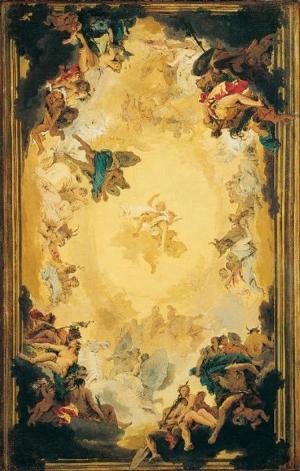The Most Interesting Stories of All Nations: North Europe — Russian — Swedish — Danish — Hungarian
Nonfiction, Religion & Spirituality, New Age, History, Fiction & Literature| Author: | Various Authors | ISBN: | 9781465590275 |
| Publisher: | Library of Alexandria | Publication: | March 8, 2015 |
| Imprint: | Language: | English |
| Author: | Various Authors |
| ISBN: | 9781465590275 |
| Publisher: | Library of Alexandria |
| Publication: | March 8, 2015 |
| Imprint: | |
| Language: | English |
No, really; I haven't the faintest idea. But let me tell you the story. You must know that about sixty years ago my grandmother went to Paris, where she created quite a sensation. People used to run after her to catch a glimpse of the 'Muscovite Venus.' Richelieu made love to her, and my grandmother maintains that he almost blew out his brains in consequence of her cruelty. At that time ladies used to play at faro. On one occasion at the Court, she lost a very considerable sum to the Duke of Orleans. On returning home, my grandmother removed the patches from her face, took off her hoops, informed my grandfather of her loss at the gaming-table, and ordered him to pay the money. My deceased grandfather, as far as I remember, was a sort of house-steward to my grandmother. He dreaded her like fire; but, on hearing of such a heavy loss, he almost went out of his mind. He calculated the various sums she had lost, and pointed out to her that in six months she had spent half a million of francs; that neither their Moscow nor Saratoff estates were in Paris; and, finally, refused point-blank to pay the debt. My grandmother gave him a box on the ear and slept by herself as a sign of her displeasure. The next day she sent for her husband, hoping that this domestic punishment had produced an effect upon him, but she found him inflexible. For the first time in her life she entered into reasonings and explanations with him, thinking to be able to convince him by pointing out to him that there are debts and debts, and that there is a great difference between a prince and a coachmaker. But it was all in vain, my grandfather still remained obdurate. But the matter did not rest there. My grandmother did not know what to do. She had shortly before become acquainted with a very remarkable man. You have heard of Count St. Germain, about whom so many marvelous stories are told. You know that he represented himself as the Wandering Jew, as the discoverer of the elixir of life, of the philosopher's stone, and so forth. Some laughed at him as a charlatan; but Casnova, in his memoirs, says that he was a spy. But be that as it may, St. Germain, in spite of the mystery surrounding him, was a very fascinating person, and was much sought after in the best circles of society. Even to this day my grandmother retains an affectionate recollection of him, and becomes quite angry if anyone speaks disrespectfully of him. My grandmother knew that St. Germain had large sums of money at his disposal. She resolved to have recourse to him, and she wrote a letter to him asking him to come to her without delay. The queer old man immediately waited upon her, and found her overwhelmed with grief. She described to him in the blackest colors the barbarity of her husband, and ended by declaring that her whole hope depended upon his friendship and amiability.
No, really; I haven't the faintest idea. But let me tell you the story. You must know that about sixty years ago my grandmother went to Paris, where she created quite a sensation. People used to run after her to catch a glimpse of the 'Muscovite Venus.' Richelieu made love to her, and my grandmother maintains that he almost blew out his brains in consequence of her cruelty. At that time ladies used to play at faro. On one occasion at the Court, she lost a very considerable sum to the Duke of Orleans. On returning home, my grandmother removed the patches from her face, took off her hoops, informed my grandfather of her loss at the gaming-table, and ordered him to pay the money. My deceased grandfather, as far as I remember, was a sort of house-steward to my grandmother. He dreaded her like fire; but, on hearing of such a heavy loss, he almost went out of his mind. He calculated the various sums she had lost, and pointed out to her that in six months she had spent half a million of francs; that neither their Moscow nor Saratoff estates were in Paris; and, finally, refused point-blank to pay the debt. My grandmother gave him a box on the ear and slept by herself as a sign of her displeasure. The next day she sent for her husband, hoping that this domestic punishment had produced an effect upon him, but she found him inflexible. For the first time in her life she entered into reasonings and explanations with him, thinking to be able to convince him by pointing out to him that there are debts and debts, and that there is a great difference between a prince and a coachmaker. But it was all in vain, my grandfather still remained obdurate. But the matter did not rest there. My grandmother did not know what to do. She had shortly before become acquainted with a very remarkable man. You have heard of Count St. Germain, about whom so many marvelous stories are told. You know that he represented himself as the Wandering Jew, as the discoverer of the elixir of life, of the philosopher's stone, and so forth. Some laughed at him as a charlatan; but Casnova, in his memoirs, says that he was a spy. But be that as it may, St. Germain, in spite of the mystery surrounding him, was a very fascinating person, and was much sought after in the best circles of society. Even to this day my grandmother retains an affectionate recollection of him, and becomes quite angry if anyone speaks disrespectfully of him. My grandmother knew that St. Germain had large sums of money at his disposal. She resolved to have recourse to him, and she wrote a letter to him asking him to come to her without delay. The queer old man immediately waited upon her, and found her overwhelmed with grief. She described to him in the blackest colors the barbarity of her husband, and ended by declaring that her whole hope depended upon his friendship and amiability.















